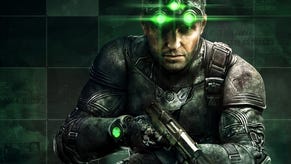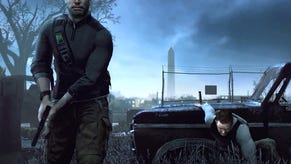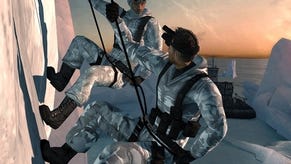Tom Clancy's Splinter Cell: Conviction
Sneak preview.
Sam Fisher is an angry man. For years he's been doing a pretty angry job, murdering from the shadows under the auspices of neo-con morality, but he's always been ready with a snappy putdown as he slips a knife around the jugular of the enemies of freedom. To a certain extent he's still up to that - "It's a good job all your training paid off," he tells a young man as he separates his vertebrae - but the new Sam Fisher is a furious one, motivated entirely by his own vengeful reasons.
Conviction's gameplay proper opens with Third Echelon info queen Grim dropping the retired Fisher a call as he's relaxing at a Maltese street café with a mochaccino, ruining an afternoon which would otherwise have been spent doing chin-ups with his teeth in a local bed and breakfast. She's calling to tell him that the killing of his daughter by a drunk driver was no accident - and that she knows whodunit.
Enraging a man who's spent time with more military units than Ross Kemp might not seem like the best idea, but it's the perfect carrot to get Sam out of retirement and back in action. It also gives Fisher a reason to get out there and be the angry badass who's been hiding under that smoothly efficient exterior the whole time.
It's a key factor in Ubisoft's 'empowerment' of Fisher, the attempt to make him feel less fragile and shadow-bound, more like a wolf rather than a trapdoor spider. It works, too. Splinter Cell is still very much a stealth game, and getting spotted can still mean a pretty swift Game Over, but this Fisher feels meaner, more ruthless - and gruffer than a Camel-smoking Billy goat.
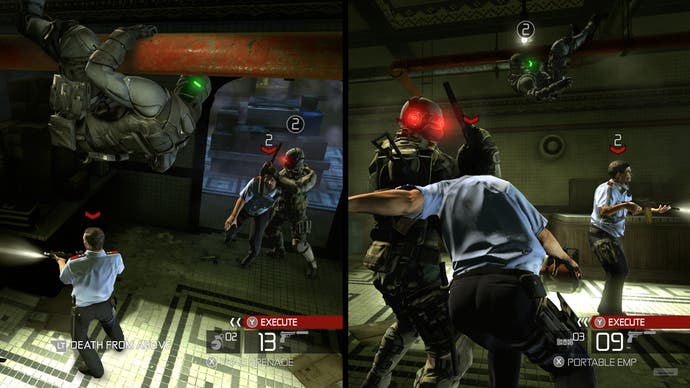
It's a new feel inspired, we're told, by the three "JBs": James Bond, Jason Bourne and Jack Bauer, something which certainly carries in the slick, cinematic visual presentation. This is apparent right from the off, with the cliff-hanger opening and the interrogation of one of Fisher's erstwhile comrades providing tight exposition and back-story, a well directed sequence which feels like the opening of a classy Hollywood blockbuster. Or at least a violent one with high production values.
Empowering Sam is reflected further in that most basic of Splinter Cell manoeuvres: taking cover. When stuck to cover and aiming at a new hiding place, a subtle indicator shows that you can slip over to the new shadow with a quick tap of a button - sliding Sam across with minimal fuss and less chance of flapping about like a dizzy child in front of a dozen terrorists.
It's smooth, and certainly helps you to feel like a deadly super-spy, enabling precise and efficient cover occupation as you approach your prey. Purists might balk a little at Ubisoft Montreal's decision to make Splinter Cell less frustrating and more permissive, but this sort of mechanic lets you feel like the product of several intensive military training programs without needing to undergo one yourself.
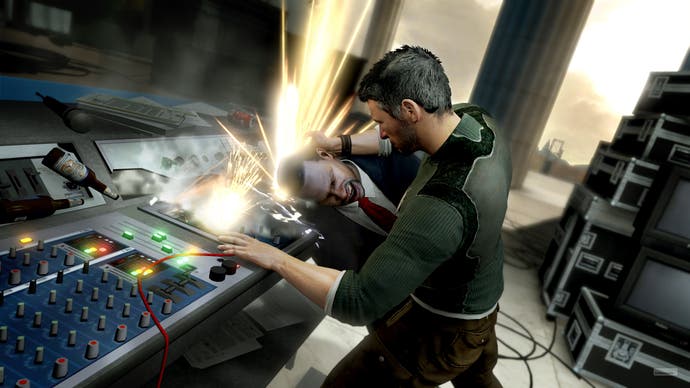
Aiming from cover offers you another example of this. Instead of the clumsy blindfire/exposed aiming dichotomy which most shooters offer, Conviction lets Sam aim accurately from behind walls and crates, only popping up to take the shot. Although Sam's default pistol can be a little wayward in its accuracy, performing this sort of snapshot from a sensible distance is almost always fatally effective. You're a ghost with steady hands, precise and predatory, and this feels entirely appropriate.
This sort of hunting, striking noiselessly from the umbra, is very much Fisher's forte, despite his less hard-line attitude to being detected. While running blindly round corners with a shotgun and some wishful thinking is possible, Conviction still feels at its most natural when you're suspended from a ceiling pipe, running a makeshift trepanning facility with a silenced Mk.23.


